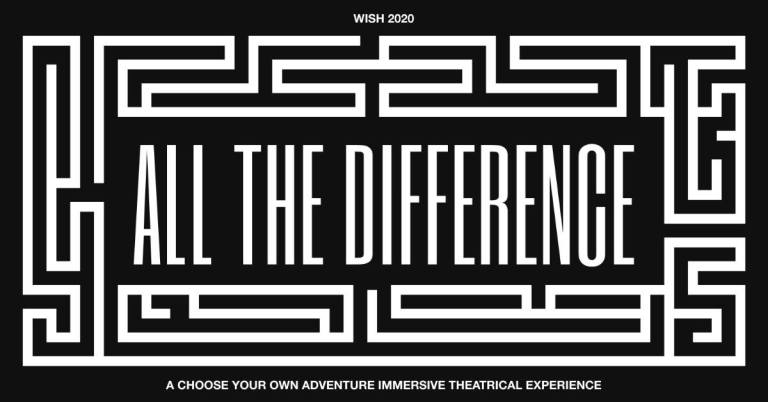“All The Difference” begins, as all plays should, with a discussion of zombie movies and copyright law. After a bit of introduction — the standard “welcome to the theater” shpiel, dressed up thematically through talk of beta testing and storytelling AIs — the first real exchange of dialogue in Ram’s Head’s production of Grace Goheen ’20’s work of interactive theater is about one of the most fascinating pieces of film nerd oral tradition. In 1968, as the story goes, zombie auteur George Romero was putting the finishing touches on his masterpiece: “Night of the Flesh Eaters.” The final change was its title, which went from “Flesh Eaters” to “Night of the Living Dead.” On the whole, it was a good move — “Flesh Eaters” doesn’t have the indescribable menace that “Living Dead” carries with it. But Romero made one critical error. In making the title card for his retitled film, the production company left off the copyright information, and therefore allowed the work to enter the public domain instantly. This small mistake allowed for the proliferation of zombie stories that cribbed heavy influence from Romero’s creations, and the cultural dominance that zombies have had on American culture for decades after. It was a good mistake.
That notion — of minor mistakes and wrong choices adding up into developments of much greater significance — is at the core of “All The Difference.” The play, which ran through February at the Prosser Studio Theatre, is focused on individual choices and the ramifications of these choices. Through the interactive show’s variable run time (my showing clocked in at roughly 60 minutes), the audience is compelled to choose different outcomes on an app designed specifically for the show by Abla Ghaleb ’21. These choices can be as arbitrary as a character’s choice of outfit, or as significant as relationship-shaping declarations of love, forgiveness or guilt.
This interactive premise, reminiscent of Black Mirror’s “Bandersnatch” special, is a provocative gamble for a limited run, small-audience production. Unlike with “Bandersnatch,” there’s no way to re-do a scene to find a different ending, no path to retrace or puzzle over. We got one shot, and we had to live with it. In practice, we sat through a normal play — one where there were theoretical branching points but no way to see behind the curtain (unless you somehow managed to game the lottery system that assigned people tickets and times).
Yet “All The Difference” didn’t feel like a normal play in the experience of watching it. Control — even in the limited, single-point interventions offered by Goheen’s script — is an intoxicating thing, making every twist and turn of the plot feel more lurid. It helps that the core of the story is solid even without the conceit. It’s a tale of post-high school malaise and paranoia, of guilt and deception, but even the tragic parts of the story — gun violence, domestic abuse — don’t feel melodramatic.
I only got a fraction of the parts of the world, but through compelling performances, it felt very lived in. In the iteration of the show I saw, the dramatic weight of the play was carried mostly by Valerie Trapp ’22, who plays the closest thing the show has to a viewpoint character, and Sameer Jha ’23, whose decisions both within and before the action drive the show’s conflict.
At its best moments, “All The Difference” uses its structure to make its plot all the more resonant — by putting you in the heads of characters making impossibly tough decisions, their outcomes weigh all the heavier. The feeling of watching things go off the rails after those choices — a night of drunken partying evolving into something more fraught and angry, a punch that takes a character almost entirely out of the plot — is the feeling that “All The Difference” most successfully conjures.
“All The Difference” struggles more when it expands beyond those key moments. The sheer ground it has to cover leaves the play occasionally stretched thin — the performances from figures like Jack Thorell ’23 and Phoebe Kimm ’20 are compelling, but they’re given less to work with in any given iteration of the play. And despite the clarity of the show’s thematics of choice and consequence, the script often feels a stroke too obvious. This is most notable in the play’s pseudo-epilogue, where Goheen talks directly through us via the pre-recorded, flanged-out voice of a robot narrator. The show’s epilogue spells out its themes and moral messages one by one, boring didactics masked as heady philosophical talk. It doesn’t make the rest of the play worse, but it just feels unnecessary, an overly-studied flourish at the end of an otherwise compelling performance.
On the whole, though, “All The Difference” convincingly achieves its ambitious goals. Even its mistakes are charming — the kind of missteps necessary to make something all the more compelling and, well, different.
Contact Jacob Sujin Kuppermann at jkupperm ‘at’ stanford.edu.
